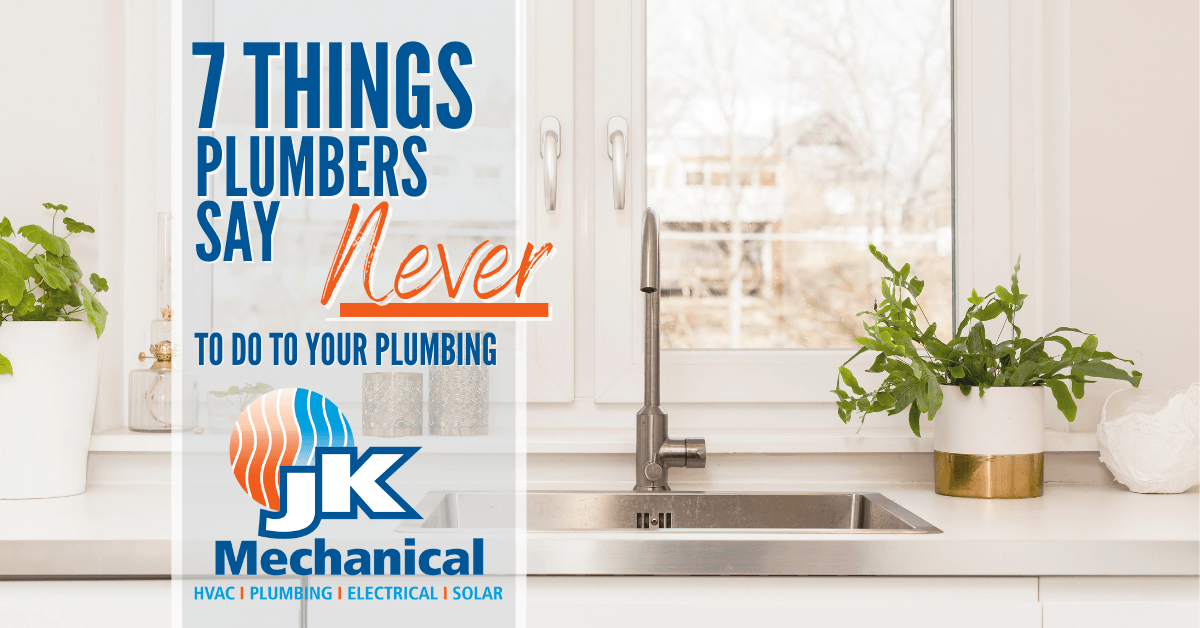7 Things Plumbers Say You Should Never do to Your Plumbing
On the JK Blog, we’ve talked about things you SHOULD do to help prevent issues with your home plumbing, and the importance of regular maintenance. But do you know what you should NOT be doing with your home plumbing? Read on for seven things you should NEVER do if you want to avoid plumbing issues down the road:
1. Don’t Pour Oil, Grease, or Starches Down the Drain
Garbage disposals can be super handy, but despite the name, they are typically not intended to be treated like a catch-all for all of your kitchen waste and scraps. Oil, grease, fat, and starches (like potato or flour) can be especially harmful over the long-term; they won’t necessarily clog your sink immediately, but over time can damage the disposal itself and cause pipe buildup and lasting drainage problems. When you do need to use your garbage disposal, be sure and run plenty of cold water, and clean occasionally by adding ice cubes. If you don’t have a disposal at all, it’s all the more reason to be cautious with what goes in your kitchen drain. Utilize a sink strainer to help catch scraps and dispose in the trash.
2. Don’t Ignore Warning Signs
A little bit of water around the base of a toilet or a gurgle in a drain might not seem like much cause for concern, but these can be ways your plumbing system is asking for help. Keeping an eye out for warning signs and addressing them with your plumber can help catch small problems before they turn into large ones.
3. Don’t Flush ANY PAPER Other than Toilet Paper
Yes, not even “flushable” wipes. One of the most common—and easily preventable—causes of household plumbing calls is flushing material that isn’t intended to be flushed such as paper towels, facial tissue, baby wipes, tampons and pads, and kitty litter. Even if it appears to flush okay and doesn’t immediately clog your toilet, a larger and harder to reach (and therefore much more expensive to fix) issue can be building further down the line.
4. Don’t Rely on Liquid Drain Cleaner
This is especially true if you have an older home and older pipes: the very chemicals that promise to get rid of clogs can eat away at your plumbing, meaning that your short-term fix can cause serious problems in the long run. If you are experiencing a clogged drain or slow drainage, call a plumber or line clearing company to give your pipes a safe, thorough cleaning.
When possible, prevent inconvenient, costly clogs before they start. Use inexpensive manual stoppers such as hair catchers in the tub, clean your drains regularly, and be mindful of what you’re putting down the drain.
5. Don’t Get Over Your Head with DIY
We love a good DIY project, and encourage our clients to keep up with routine, DIY maintenance tasks in order to keep their home comfort systems in shape between maintenance appointments. However, when it comes to larger projects such as remodels, replacements, and large-scale or complicated repairs, we can’t all be Chip & Joanna. If you try to take on more than you can handle with your home plumbing, electric, and HVAC, the results can quickly become expensive and dangerous. When starting a DIY project at home, be honest with yourself about your skill level, research your project and materials thoroughly, take every safety precaution, and call in a professional for work you don’t feel comfortable with.
Bonus tip: At your yearly JK Precision Tune-Up, ask your plumber to walk you through your system and identify important components such as your shut-off valves and supply lines so that you can identify them in case of emergency or work in the future.
6. Don’t Put Your Trust in Cheap Fixtures
When trying to cut costs on a replacement or repair, it can be tempting to save short-term by bargain-hunting for fixtures. However, consider that your plumbing fixtures—your toilet, your faucets, your shower fixtures, etc—are parts of your home that will typically be used multiple times a day, every day, for years to come. Quality parts and fixtures from reputable suppliers and installers can make the difference between planning for a replacement three years later or twenty—let alone the risk of water damage if something fails.
The product warranty is also important. All JK-supplied and installed plumbing fixtures are warranted for at least a year and sometimes longer depending on the make and model, giving you peace of mind (and relief for your wallet) if something should go wrong. Last but not least, fixability and availability of replacement parts can also be a concern with out-of-date fixtures or unknown brands. If a component of your off-brand faucet fails and a replacement isn’t available, you may find yourself forced to replace the whole fixture sooner than you planned, negating the up-front savings.
7. Don’t Neglect Regular Preventative Maintenance
Protect the investment you’ve made in your home and schedule regular preventative maintenance visits with your trusted JK Plumber. During your Precision Tune-Up we test and inspect fixtures, water lines, water pressure, sump pump, and shutoff valves to ensure that everything is in good working condition and identify potential problems. In addition, the technician can perform a water heater flush, which (depending on your style and model of water heater) should be performed at least once a year to clear sediment buildup.
Whether you’re due for maintenance or in need of service, the JK Plumbing team is available 24/7 for assistance. Contact us or book service online today.


